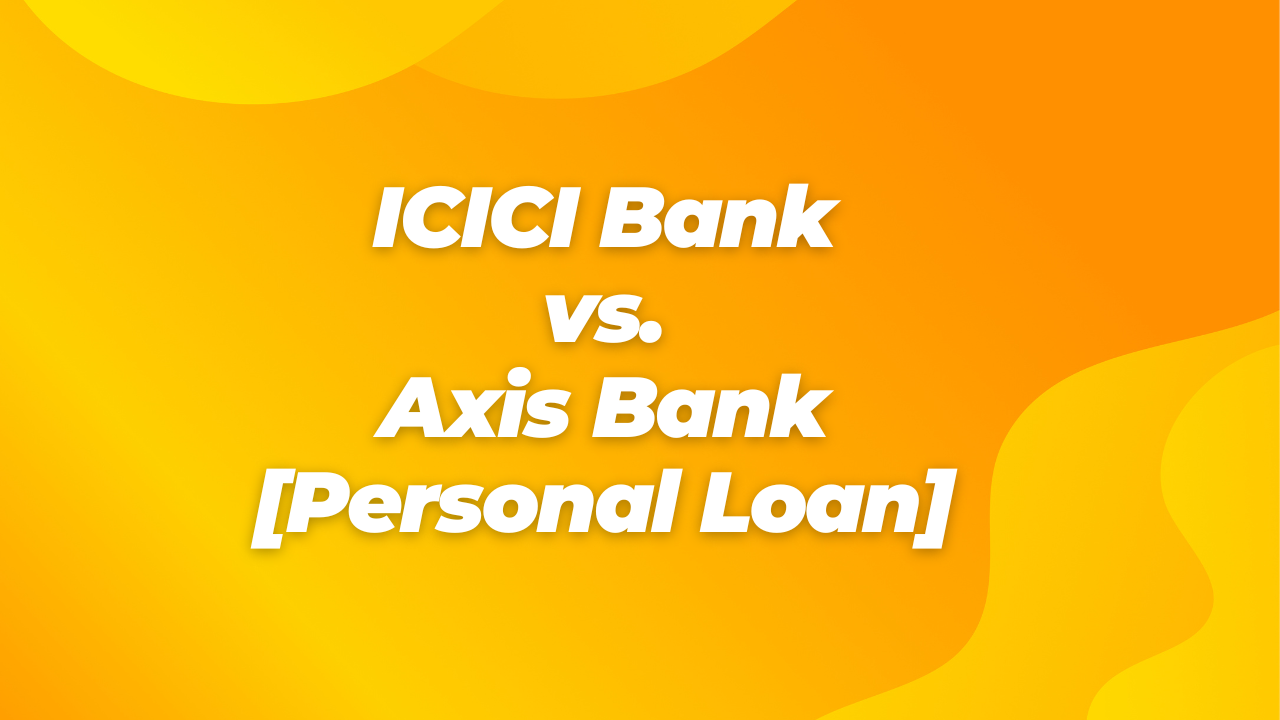When considering a personal loan in India, two of the most popular banks come to mind: ICICI Bank and Axis Bank. Both institutions are known for their competitive offerings, excellent customer service, and robust banking infrastructure. However, choosing the right one can be challenging, as the terms, benefits, and conditions vary.
This guide will help you compare ICICI Bank and Axis Bank personal loans to determine which one aligns best with your financial needs.
Best Features
Here’s a quick snapshot of the features offered by ICICI Bank and Axis Bank personal loans:
Feature | ICICI Bank | Axis Bank |
|---|---|---|
Loan Amount | ₹50,000 – ₹50 Lakhs | ₹50,000 – ₹40 Lakhs |
Interest Rate | 10.50% – 19.00% p.a. | 10.49% – 20.00% p.a. |
Loan Tenure | 12 – 72 months | 12 – 60 months |
Processing Fee | 1.50% – 2.50% of the loan amount + GST | 1.50% – 2.00% of the loan amount + GST |
Prepayment Charges | 5% of the outstanding amount | 2% – 5% of the outstanding amount |
Approval Time | Within 3 seconds (for existing customers) | Within 24 hours |
Eligibility Criteria | Salaried or self-employed individuals | Salaried or self-employed individuals |
Detailed Comparison
Interest Rates
Interest rates play a significant role in determining your overall loan cost.
- ICICI Bank: Offers interest rates starting at 10.50% p.a. These rates may vary based on your credit score, loan amount, and repayment tenure.
- Axis Bank: Starts at a slightly lower 10.49% p.a., but the maximum rate goes up to 20%, depending on factors like creditworthiness and loan tenure.
Verdict: Axis Bank has a marginally lower starting interest rate, but ICICI Bank’s maximum cap is more competitive, making it better for borrowers with average credit scores.
Loan Amount
The maximum loan amount determines how much you can borrow based on your needs.
- ICICI Bank: Allows personal loans up to ₹50 Lakhs, catering to higher-value requirements.
- Axis Bank: Offers loans up to ₹40 Lakhs, making it suitable for moderate financial needs.
Verdict: ICICI Bank takes the lead with a higher loan amount, making it ideal for significant expenses like weddings or debt consolidation.
Loan Tenure
Loan tenure affects your monthly EMI and total repayment cost.
- ICICI Bank: Offers flexible repayment tenures ranging from 12 to 72 months.
- Axis Bank: Provides repayment options between 12 to 60 months.
Verdict: ICICI Bank wins this round with a longer tenure, offering more flexibility to borrowers.
Processing Fees
Both banks charge a non-refundable processing fee, which is a percentage of the loan amount.
- ICICI Bank: Charges between 1.50% and 2.50% of the loan amount.
- Axis Bank: Charges between 1.50% and 2.00% of the loan amount.
Verdict: Axis Bank has a slight edge with lower maximum processing fees, saving you money upfront.
Prepayment and Foreclosure Charges
Prepayment or foreclosure charges are incurred if you pay off your loan early.
- ICICI Bank: Charges 5% of the outstanding loan amount as prepayment fees.
- Axis Bank: Charges 2% to 5%, depending on the tenure and loan terms.
Verdict: Axis Bank offers more flexibility in prepayment charges, potentially saving you money if you plan to close the loan early.
Approval Time
Fast approval is critical for urgent financial needs.
- ICICI Bank: Provides instant loan approvals for pre-approved customers, with disbursal in as little as 3 seconds.
- Axis Bank: Approves loans within 24 hours, depending on eligibility and documentation.
Verdict: ICICI Bank is a clear winner for speed, especially for existing customers.
Eligibility Criteria
Both banks cater to salaried and self-employed individuals, but their specific requirements differ.
Criteria | ICICI Bank | Axis Bank |
|---|---|---|
Age | 23 – 58 years | 21 – 60 years |
Minimum Income | ₹25,000 per month | ₹15,000 per month |
Work Experience | At least 2 years | At least 1 year |
Credit Score | 750 or above | 750 or above |
Verdict: Axis Bank has slightly relaxed income and age criteria, making it accessible to a broader range of borrowers.
EMI Comparison for ₹5,00,000 Loan
Here’s how the EMI differs for a ₹5,00,000 loan for a tenure of 5 years at each bank’s minimum interest rate:
Bank | Interest Rate | EMI (5 years) | Total Interest Paid | Total Repayment |
|---|---|---|---|---|
ICICI Bank | 10.50% p.a. | ₹10,744 | ₹1,44,640 | ₹6,44,640 |
Axis Bank | 10.49% p.a. | ₹10,742 | ₹1,44,520 | ₹6,44,520 |
Verdict: The difference is negligible, but Axis Bank offers slightly lower EMIs and total repayment.
Pros and Cons of ICICI Bank Personal Loans
Pros
- High loan amount of up to ₹50 Lakhs.
- Longer loan tenure (up to 72 months).
- Instant approval for pre-approved customers.
Cons
- Higher processing fees compared to Axis Bank.
- Prepayment charges fixed at 5%.
Pros and Cons of Axis Bank Personal Loans
Pros
- Lower processing fees (up to 2%).
- Competitive interest rates starting at 10.49%.
- Flexible prepayment charges.
Cons
- Lower maximum loan amount (₹40 Lakhs).
- Shorter loan tenure (up to 60 months).
Which Bank is Right for You?
Choose ICICI Bank if
- You need a higher loan amount (up to ₹50 Lakhs).
- You prefer longer loan tenures (up to 72 months).
- You are an existing customer looking for instant approvals.
Choose Axis Bank if
- You want slightly lower interest rates and processing fees.
- You need flexibility in prepayment or foreclosure charges.
- You meet the relaxed eligibility criteria and prefer quicker documentation.
Our Recommendation
Both ICICI Bank and Axis Bank offer excellent personal loan options, each with its own advantages. Your choice should depend on your specific financial needs, eligibility, and priorities.
If you need a larger loan or longer tenure, ICICI Bank might be the right choice. On the other hand, if you value lower fees and flexible prepayment options, Axis Bank could be the better fit.
Before applying, compare the features, use an EMI calculator to determine repayment affordability, and ensure your credit score meets the eligibility criteria for the best offers.

Rahul is a finance enthusiast and content strategist with a passion for simplifying complex financial concepts. With years of experience in personal finance, credit cards, and loans, he helps readers make informed decisions through comprehensive guides and expert insights.

